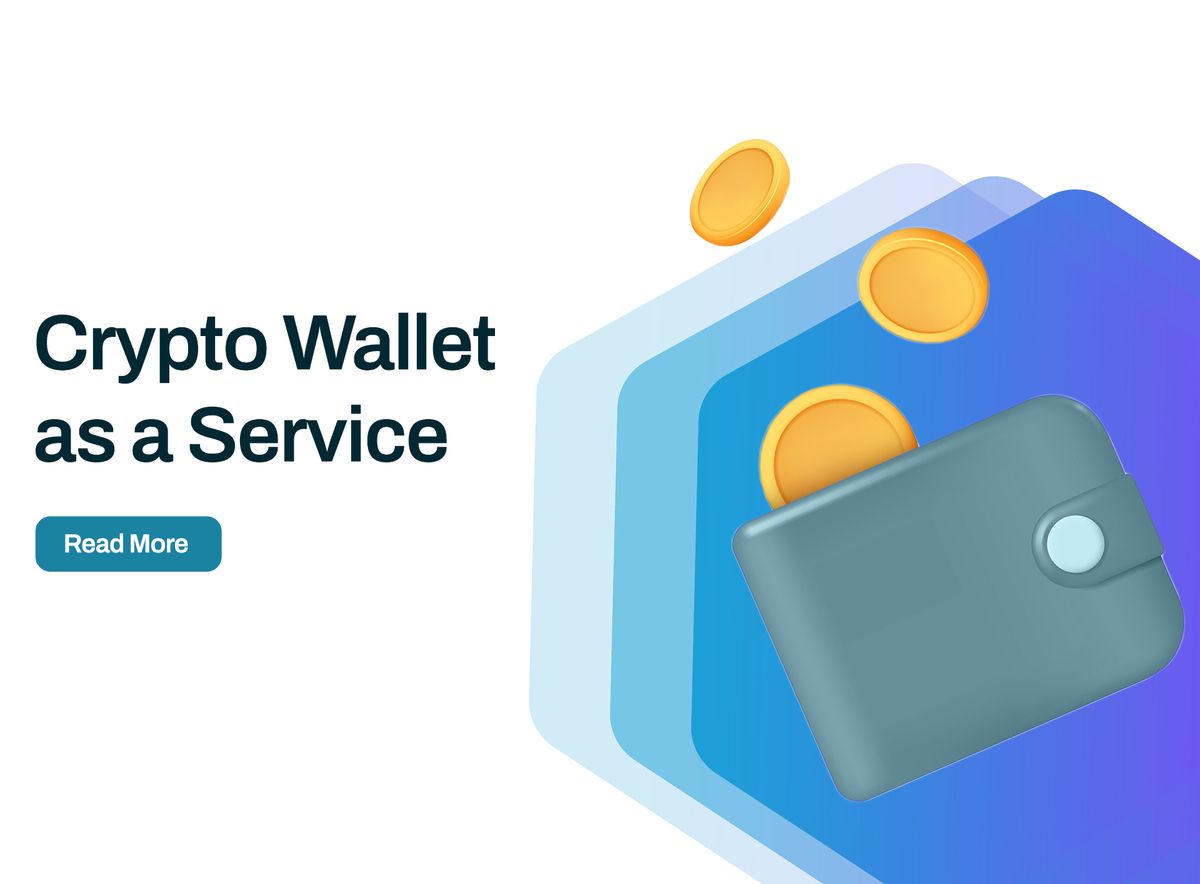Crypto Wallet as a Service: A Simple Guide
WaaS stands for Wallet as a Service. It’s a cloud-based solution that allows businesses to quickly and securely integrate cryptocurrency wallets into their platforms without managing complex technical infrastructure.

Imagine a wallet service that takes away the hassle of managing digital currencies for your business. That’s what Wallet as a Service (WaaS) does.
It’s a secure, scalable solution that allows companies to easily integrate cryptocurrency management into their operations without worrying about the complicated parts, like blockchain integration, key recovery, or security.
Let's break it down for you and explain how it works, how it differs from regular crypto wallets, and why you might want to consider it for your business.
What is a Crypto Wallet?
A crypto wallet is like a digital version of your physical wallet, but instead of holding cash, it manages your cryptocurrency, such as Bitcoin, Ether, USDT, and more.
The key difference is that crypto wallets don’t actually store your coins. Instead, they give you access to the blockchain, where your cryptocurrency transactions are recorded.
Think of it like a key to your safe deposit box – it doesn’t hold your valuables but lets you access them when necessary.
For example, when Bitcoin first started, its creator, Satoshi Nakamoto, sent 10 bitcoins to another person, Hal Finney, using a digital wallet. This was one of the earliest transactions that sparked the entire crypto movement.
Types of Crypto Wallets
1. Hardware Wallets:
These are physical devices, like a USB drive, that store your crypto keys offline. Because they’re not connected to the internet, they’re more secure against hacking. It’s like having a safe where you store your important papers—you only access it when needed.
You can use a hardware wallet to manage coins from multiple exchanges. It’s backed up with a simple recovery phrase or PIN code.
2. Software Wallets (Hot Wallets):
These wallets are on your internet-connected devices, like your phone or computer. They’re super convenient, letting you trade or buy things with crypto instantly. While they’re easy to use, you have to trust a third party to manage your assets.

How Does Wallet as a Service (WaaS) Work?
Wallet as a Service (WaaS) lets businesses integrate a fully functional cryptocurrency wallet into their platforms without worrying about managing the complex technology themselves.
Imagine if you could add a “wallet” feature to your app as easily as plugging in a new payment method.
This means your business can offer users a seamless way to manage, store, and trade digital assets while you focus on your main business products and services.
Regular Crypto Wallets vs. Wallet as a Service (WaaS)
Most regular crypto wallets are custodial wallets, meaning a third party holds the keys to your funds. This is convenient but limits your control—you trust someone else to keep your crypto safe.
WaaS, on the other hand, often uses non-custodial wallets, where you control your own keys. This gives you more privacy and control over your funds.
Non-custodial wallets are great for accessing decentralised finance (DeFi), NFT marketplaces, or Web3 games.
Here are some common types of wallets offered by WaaS providers:
- Smart Wallets:
These are controlled by smart contracts (a piece of code on the blockchain) rather than just a private key. This means you can have features like social recovery (where trusted contacts help you recover your wallet if you lose access) and programmable transactions (automated payments). - Embedded Wallets:
These wallets are built directly into apps, so users don’t have to jump between platforms to manage their assets. It’s like having a digital wallet inside your favourite shopping app—easy and secure, without needing to remember extra passwords. - Multi-Sig Wallets:
This type of wallet requires multiple approvals to make a transaction. Imagine running a business where every payment needs approval from two or three managers—multi-sig wallets make sure no single person can make big decisions on their own. - MPC (Multi-Party Computation) Wallets:
Here, your private key is split into multiple parts and distributed to different parties. It’s like having a vault where each person holds part of the combination, making it super secure since no one has full access.
Why Should You Use Wallet as a Service (WaaS) for Your Business?
Wallet as a Service (WaaS) offers several benefits that make it a smart choice for businesses looking to integrate crypto payments or services:
- Security:
WaaS providers implement advanced security measures like encryption and multi-factor authentication to protect your digital assets from hackers. - Scalability:
As your business grows, WaaS can grow with you. Need to add more payment methods or handle a larger volume of transactions? WaaS can easily scale up without you needing to invest in new payment infrastructure. - Quick Integration:
With WaaS, you don’t have to build a wallet from scratch. Instead, you can quickly integrate it with your existing systems, offering users new payment options without the headache of developing your own tech. - Cost-Effective:
WaaS typically operates on a monthly fee or per-transaction basis, which is often more affordable than creating your own digital wallet system from the ground up. - Better Customer Experience:
By offering a variety of payment options, you create a smoother experience for your customers. This can boost satisfaction and loyalty, just like how offering multiple ways to pay at checkout increases convenience for shoppers.
Choosing the Right Wallet as a Service Provider
When picking a WaaS provider, consider the following:
- Security:
Look for providers that offer strong encryption and multi-factor authentication. - Reputation:
Research their track record—read reviews and case studies from other clients. - Customer Support:
Ensure they offer good customer service, so you can get help when needed. - Pricing:
Choose a provider with transparent pricing that fits your budget. - Integration:
Ensure the service can be easily integrated into your existing systems and customized for your needs.
To Recap
- Wallet as a Service (WaaS) can be a game-changer for businesses looking to offer secure and scalable digital wallet solutions without diving into the complexities of blockchain tech themselves.
- By choosing the right provider, you can stay focused on growing your business while giving your customers a seamless experience managing digital assets.
FAQs
Q: What is Wallet as a Service (WaaS)?
A: WaaS stands for Wallet as a Service. It’s a cloud-based solution that allows businesses to quickly and securely integrate cryptocurrency wallets into their platforms without managing complex technical infrastructure.
Q: How does a crypto wallet work?
A: A crypto wallet allows you to manage your cryptocurrencies like Bitcoin or Ethereum. However, it doesn’t store your coins. Instead, it provides access to the blockchain, where your coins are recorded, similar to how an online bank account lets you manage your money without physically holding it.
Q: What’s the difference between a regular crypto wallet and Wallet as a Service (WaaS)?
A: Regular crypto wallets, especially custodial ones, are managed by third parties who hold your private keys, meaning they control access to your funds. With WaaS, you typically get non-custodial wallets, giving you full control of your private keys and offering greater autonomy, privacy, and security.
Q: What types of wallets does WaaS offer?
A: WaaS typically offers:
- Smart Wallets: Controlled by smart contracts, providing features like programmable transactions and social recovery.
- Embedded Wallets: Built into apps or websites for seamless interaction.
- Multi-Signature (Multi-Sig) Wallets: Require multiple approvals for transactions, enhancing security for shared accounts.
- MPC (Multi-Party Computation) Wallets: Split private keys among multiple parties for higher security.
Q: Why should my business use WaaS?
A: WaaS offers several advantages:
- Security: Advanced encryption and multi-factor authentication protect your customers’ assets.
- Scalability: WaaS scales with your business as it grows.
- Quick Integration: Seamlessly integrate wallets into your existing systems.
- Cost-Effectiveness: WaaS is usually cheaper than building your own wallet infrastructure.
Q: What should I consider when choosing a WaaS provider?
A: Key factors include:
- Security: Look for encryption, multi-factor authentication, and regulatory compliance.
- Reputation: Check customer reviews and the provider’s track record.
- Customer Support: Ensure the provider offers responsive support.
- Pricing: Make sure the cost is transparent and fits your budget.
- Integration Capabilities: Verify if the service can integrate with your current systems.
Q: What are the costs associated with Wallet as a Service (WaaS)?
A: WaaS solutions typically charge a monthly or per-transaction fee. This is usually more cost-effective than developing and maintaining your own digital wallet infrastructure.
Q: How does Wallet as a Service (WaaS) help with scalability?
A: WaaS can grow with your business. Whether you need to add new payment methods or handle more transactions, WaaS solutions can scale without requiring additional infrastructure or resources.
Q: Can WaaS work across multiple blockchains?
A: Yes, many WaaS solutions are compatible with multiple blockchains, allowing users to manage different cryptocurrencies within a single wallet.
Q: What are embedded wallets?
A: Embedded wallets are built directly into apps or websites, allowing users to manage crypto assets without switching platforms. They offer a seamless experience, enhanced security, and, in some cases, even gasless transactions where the platform covers transaction fees.
Q: What are the benefits of multi-sig wallets?
A: Multi-sig wallets require multiple approvals for transactions, improving security for shared or business accounts. They reduce the risk of unauthorised access and provide flexible control over funds.
Q: What is a smart wallet?
A: A smart wallet is a type of wallet managed by a smart contract rather than solely by private keys. It offers features like social recovery (allowing trusted contacts to help recover your wallet) and programmable transactions, providing enhanced security and flexibility.
Disclaimer: This article was written to provide guidance and understanding. It is not an exhaustive article and should not be taken as financial advice. Obiex will not be held liable for your investment decisions.
